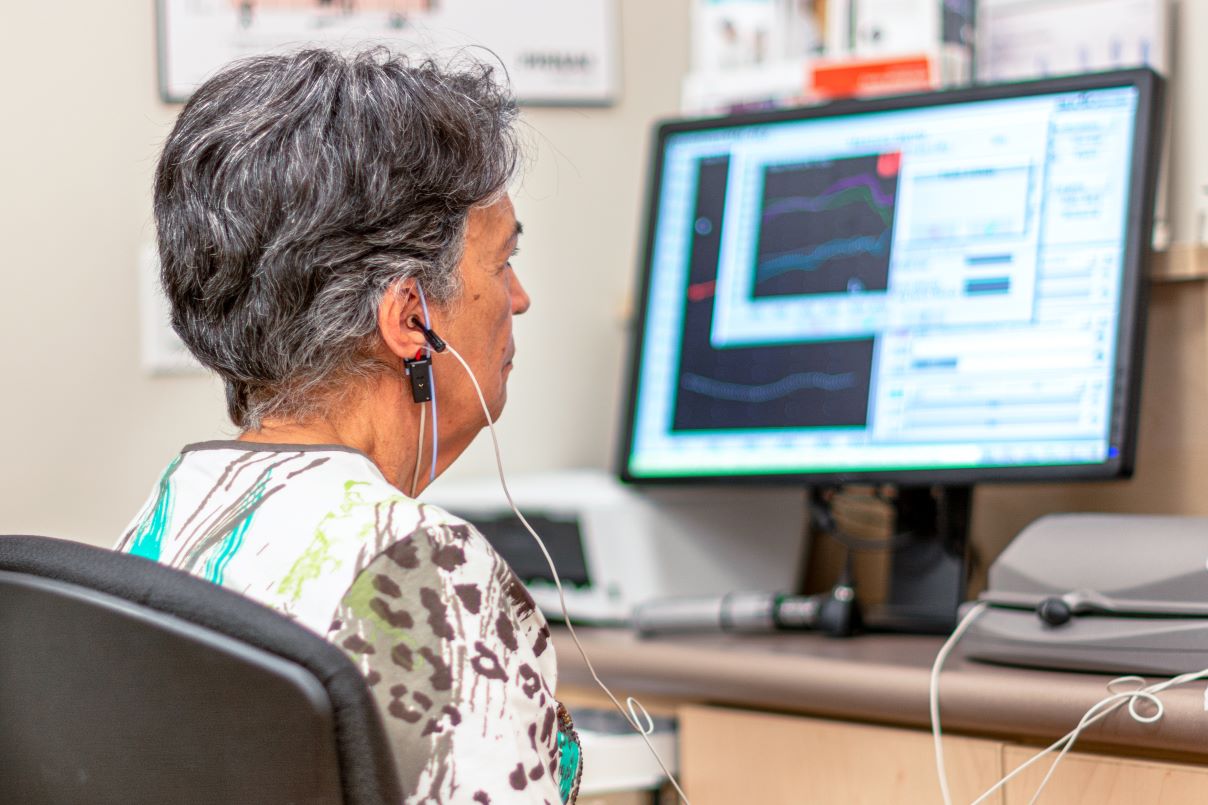Our ability to hear is a gift often taken for granted until it’s gone. With 1 in 6 people in the UK suffering from a degree of hearing loss, many people are left wondering ‘Can my hearing loss be reversed?’.
Hearing loss can be influenced by a range of factors, including genetics, and the ageing process. Whilst previously accepted as an irreversible condition, recent medical advancements have suggested hearing loss could, in fact, be reversible to an extent.
This article will explore the different types of hearing loss, their causes, which ones are potentially reversible, some preventative measures and potential future solutions to the UK’s second-largest disability.

What are the different types of hearing loss?
It’s important to understand the different types of hearing loss before delving into their potential to be reversed. There are two main types of hearing loss: sensorineural and conductive hearing loss.
Sensorineural Hearing Loss
Sensorineural hearing loss occurs when the tiny hair cells inside the inner ear become damaged. These hair cells, inside both the cochlear and auditory nerve, play a vital role in our hearing function. The hair cells convert sound vibrations into energy, allowing recognition by the brain. Once damaged, the brain is no longer able to register sound, resulting in reduced or even total loss of hearing.
Conductive Hearing Loss
Conductive hearing loss stems from issues with the middle or outer ear, where sound is prevented from reaching the inner ear. Causes of this can be perforation of the eardrum, either from injury or disease or changes to the structures behind the eardrum such as disarticulation of the three ossicles or a stiffening of the ossicular chain from additional bony growth known as otosclerosis.
Mixed Hearing Loss
It is also possible to experience a combination of both sensorineural and conductive hearing loss. This can be challenging when fitting hearing aids as the power requirements can be much higher than normal and there is a risk of the hearing aids feeding back. Modern digital hearing aids have very advanced feedback detection and cancellation circuitry that can help minimise these problems while keeping the volume of the hearing device loud enough to correct the patient’s hearing loss.
What causes hearing loss?
Various factors can influence sensorineural hearing loss, the most commonly associated factor is ageing. As we get older, our bodies experience general wear and tear; this is no different for the ears. The tiny hair cells in our inner ear reduce over time, failing to regenerate as quickly as they once did. This in turn reduces our hearing capacity.
Our lack of hearing can also be sped up through prolonged exposure to loud noises. Repeatedly exposing those tiny hair cells to high levels of noise can cause them to become damaged, meaning they eventually die.
Conductive hearing loss on the other hand often results from blockages, such as earwax, a build-up of fluid, a perforated eardrum, or an ear infection. Earwax build-up often occurs due to our body creating it faster than we can get rid of it.
Using earbuds can also contribute to conductive hearing loss as the user is more likely to push wax further into the canal and impact it, making it denser and harder to get rid of naturally. Fluid build-up can occur due to a cold, allergies or ear infections, and perforated ear drums occur due to injury such as a severe blow to the ear, or sudden changes in air pressure.
For some tips on preventing ear infections, read our article ‘Tips for preventing ear infections and hearing loss’.
Can hearing loss be reversed?
Now we know about the types and various causes of hearing loss, we can explore the possibilities for reversing it.
Sensorineural Hearing Loss
Unfortunately, sensorineural hearing loss isn’t easily reversed. Once damage is done to the hair cells, the effects tend to be permanent. As of right now, damage to the hair cells in our inner ear cannot be repaired or regenerated naturally. However, there is ongoing research into methods of restoring sensorineural hearing loss through stem cell research and gene therapies, offering hope for the future.
Conductive Hearing Loss
Conductive hearing loss has a much higher possibility for restoration on the positive side. Due to the nature of this hearing loss often being attributed to a blockage or infection, treatments involving earwax removal and antibiotics can more often resolve the issue.
While not all hearing loss is reversible, there are numerous methods and preventative measures for dealing with hearing loss and reducing its progression.

How to prevent hearing loss?
The most effective means of preventing hearing loss is early detection by booking regular hearing tests. Recognising the signs and seeking medical help and advice can significantly impact the extent of your hearing loss. Due to the gradual nature of hearing loss, it can be difficult to become aware of its impact on your daily life.
Simple procedures such as earwax removal can be a quick and straightforward fix. At Hearing Therapy, we provide services in endoscopic wax microsuction, ear irrigation and manual wax removal methods.
Here are some additional tips for preventing hearing loss:
- Avoid inserting objects into your ears: Avoid cotton buds or other ear-cleaning devices as this can push the earwax further down your ear canal. This may damage your eardrum or lodge the object in your ear.
- Protect your ears from loud noises: Repetitively exposing your ears to loud noises such as music or power tools can have a lasting effect on your hearing health. Wear ear protection to shield your ears where necessary. Read our article on ‘Why is it important to protect your hearing’ for more information.
- Get regular hearing check-ups: Regular appointments with an expert audiologist who can professionally clean your ears and check for damage offer you peace of mind for your hearing health.
Hearing Therapy offers the very best in audiology services, with patient-focused care and expert advice and treatment for all our clients. Learn more about our services.
In cases where hearing loss is permanent, help in managing and improving your hearing can be provided through hearing aids and cochlear implants. Both have been proven effective in improving hearing as they amplify sounds and convert them into electrical signals. Our brain is better able to transmit this, improving our hearing ability.
Neither hearing aids nor cochlear implants cure the issue of hearing loss, however, they can greatly enhance your quality of life.
If you think you may benefit from hearing aids, read our guide ‘The Best Hearing Aids Available in the UK in 2023’ to find out some more helpful information.
If you or anyone you know is suffering from hearing loss or has concerns for their hearing health, book an appointment with a member of our specialist audiologists today to start receiving treatment.
Whether you are in the early stages, or more developed stages of hearing loss, Hearing Therapy can help you with expert advice and services, including hearing tests, earwax removal and hearing aid fittings.
Contact us today to book an appointment and take control of your hearing health.
